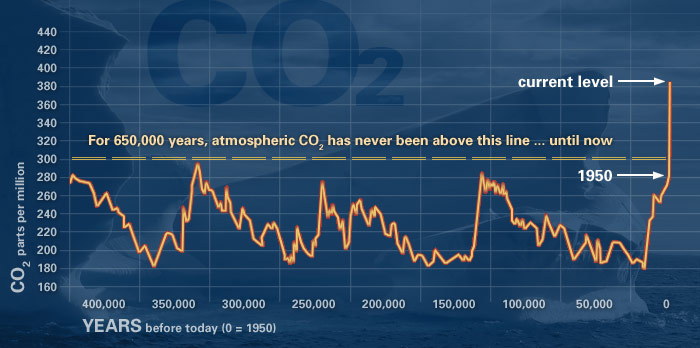It's Just Data: Climate Discourse Part 2
Coming to terms with the idea that the climate portion of climate change, it is crucial to the conversation; that we explore why using the correct langue creates an axiological (fundamental system of values that we use to give meaning) problem for
people. First of all, the data that we face on our everyday lives contains an
almost indigestible level of information that puts us in the position to give
cognitive attribution to it. This is of extreme importance since our perception
of the data is intrinsically tied to how we will perceive the data.
(Miller, 2001) For example the graphic to the right observes the
disproportionate amount of CO2 released in the past decades in comparison to a
general climate variation of rises and falls in CO2 concentrations. The public
opinion mainly relies in a cognitive model which describes and at times
dismisses this data under assumptions of validity in terms of interpretations
of a attribution model of the term variation and social associations
with the fluctuating nature of the syntax. (Miller, 2001) In terms of
scientific discourse, we given axiological meaning and value to simple
empirical data. Interpretations of this nature are then amplified by media
agenda events which derive fact from axiological contingency. Regardless of the
conduit examples of this create an ontological debate of the nature of research
which furthers claims of public discourse that are negligent to the data
itself. Put simply, data is just data, nothing more and nothing less. What kinds of attributions do you associate with certain data sets?

References
Miller, C. A. (2001). Challenges in the application of science to global affairs: Contingency, trust, and moral order. Changing the atmosphere: Expert knowledge and environmental governance, 247-85

National Oceanic and
Atmospheric Administration. Some description adapted from the Scripps CO2
Program website, "Keeling Curve Lessons."
References
Miller, C. A. (2001). Challenges in the application of science to global affairs: Contingency, trust, and moral order. Changing the atmosphere: Expert knowledge and environmental governance, 247-85

Comments
Post a Comment
Let your knowledge, ideas, and innovation be heard. Tell us what you think and know about this topic.